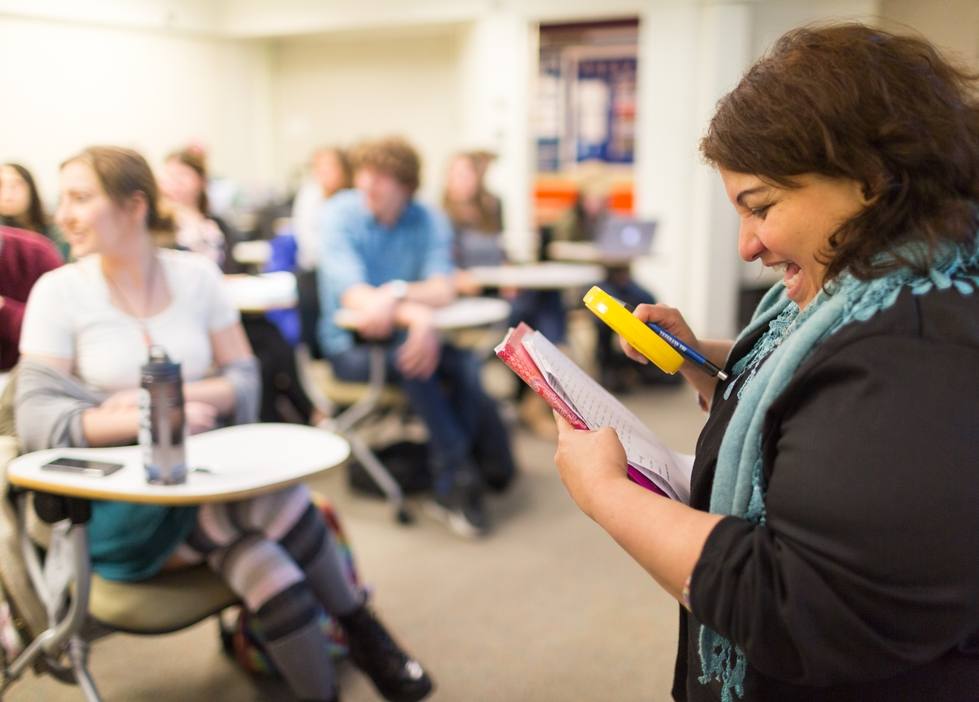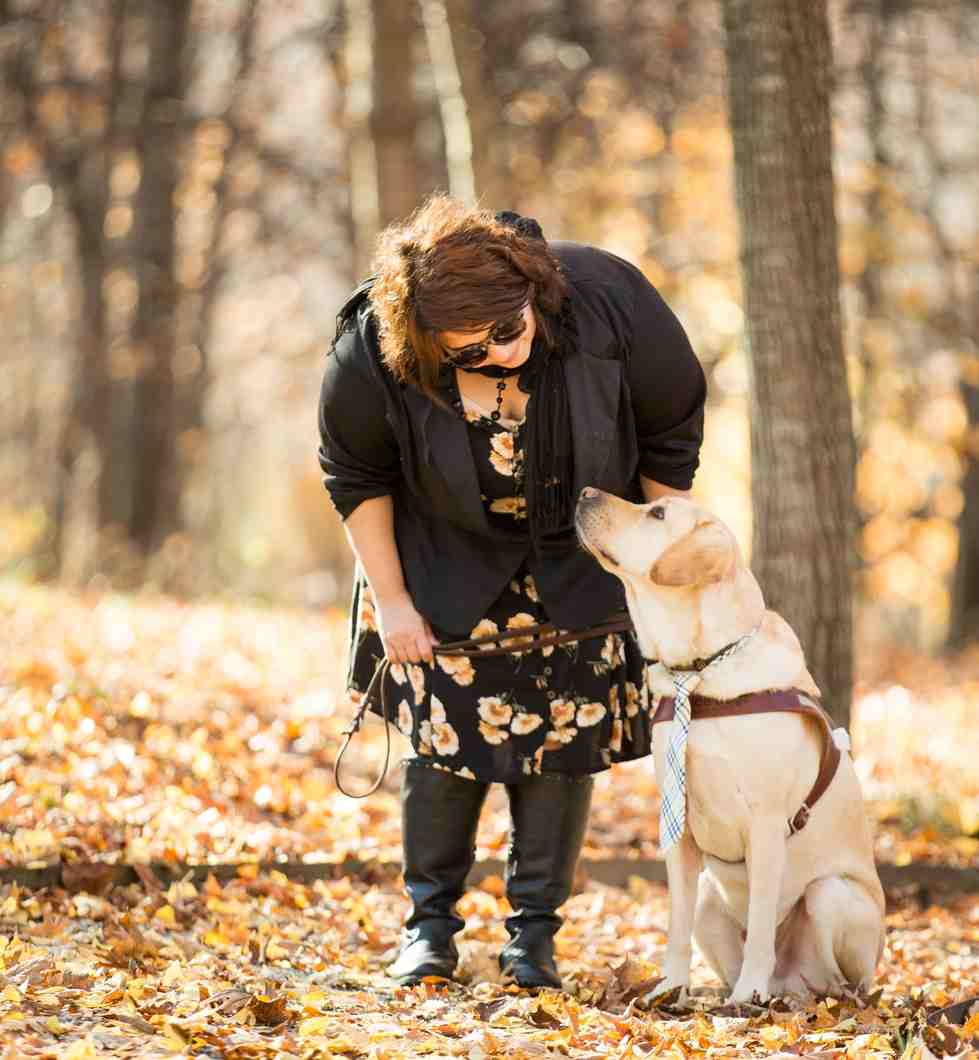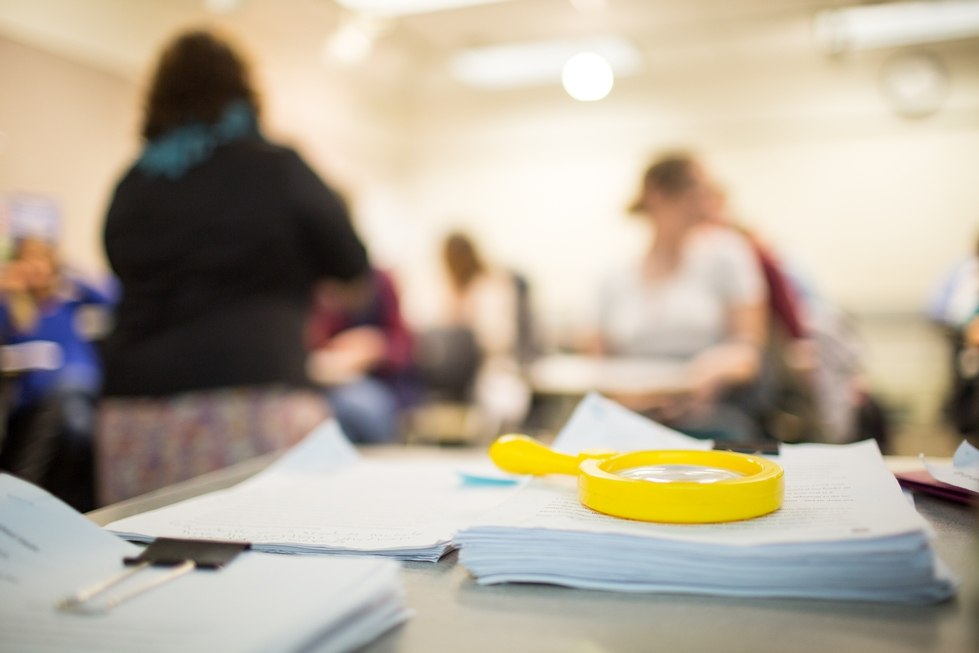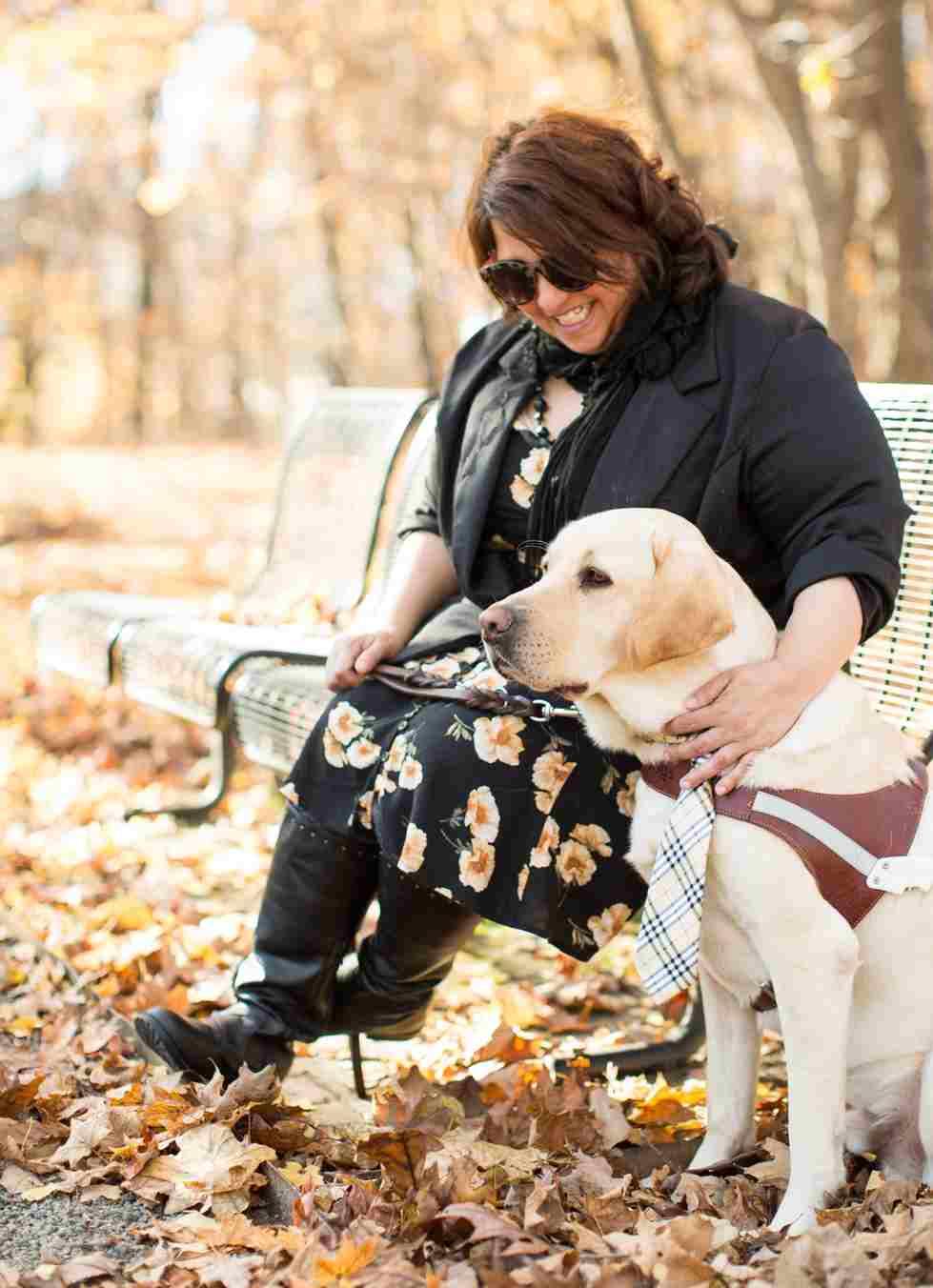Seeing the world through a peep hole
Professor turns incurable vision diagnosis into inspirational outlook on life, teaching
by Matthew Makowski
photos by Amanda Pitts
She doesn’t know when or where it might happen, but some day, Melba Vélez Ortiz may go completely blind.
All of her life, Vélez Ortiz, associate professor of communications, has lived with retinitis pigmentosa (RP), a genetic disorder that causes a gradual loss of vision, beginning with decreased night vision and loss of peripheral vision.

Melba Vélez Ortiz uses a magnifying glass during class to help her read her notes, work by students, and, occasionally, even see the students themselves.
Imagine Vélez Ortiz’s surprise when she learned in her early 20s that she had been born with an incurable, inoperable and unpredictable disease, despite the rest of her family having near-perfect vision.
Before diving into her story, it is important to note that Vélez Ortiz, an internationally respected communication ethicist, prefers to speak about blindness with a positive spin, especially through the use of puns.
“I do that on purpose as a way to educate people about the way in which we use language to talk about blindness,” said Vélez Ortiz. “I want to help people think about how, almost universally, any linguistic reference to sight or vision is positive and, conversely, references to blindness or lack of sight are negative. I have to draw attention to that, and not in a subtle way.”
All vision-related puns in this story are Vélez Ortiz-approved, and if they cause an uncomfortable reaction, that’s the point.
Didn't see it coming
Vélez Ortiz visited her eye doctor for a routine checkup about 20 years ago. During the appointment, she opted to take a discounted retina examination, and was blindsided by the results that showed she had all the symptoms of RP.
“I’ll never forget the look of seriousness and distress on the doctor’s face when he came back with the results. I immediately wondered what could be done to cure it, and when I would go blind,” said Vélez Ortiz. “They didn’t have an answer for me then, and they still don’t.”
When Vélez Ortiz showed signs of vision loss in her youth, she chalked them up to clumsiness.
“I tried to play volleyball, but I didn’t make it very far with the team because I didn’t have peripheral vision,” Vélez Ortiz said. “I just thought I was bad at sports because the ball would drop next to me but I couldn’t see it.”
Driving proved to be a tall order as well for Vélez Ortiz as multiple minor accidents slowed her acquisition of a driver’s permit.
“Peripheral vision comes in handy when you try to drive,” she said, jokingly. “I told myself that I was just a bad driver and clumsy. Who goes around thinking as a teenager that they might be going blind? I always had an excuse.”
Spaghetti and meatballs
Vélez Ortiz described living with RP as viewing the world through a “peep hole.” She currently functions with about 9 percent of what’s considered a normal field of vision.
Vélez Ortiz visits her eye doctor once every three years so her vision loss can be measured, but with RP, there is no timeline for when a person completely loses vision. There is also a chance that she will never completely lose her vision, but regardless, it will continue to diminish over time.
“A woman with RP once told me that she sat down to eat her spaghetti and meatballs, which she could see, and by the time she finished that meal, her vision was completely gone,” said Vélez Ortiz. “That’s the scary thing about RP — it can be gradual, or it can be sudden. I’m very lucky, even if I can only see through a ‘peep hole,’ and I celebrate that.”
To combat the uncertainties of the disease, Vélez Ortiz follows a branch of Latin American philosophy called vitalism, or “happy pessimism.”
“In this view, you are not an optimist, and you don’t wake up every day thinking, ‘They will find a cure’ or ‘Things are going to be just dandy,’ because chances are things will get worse. But you don’t let go of your joy and your desire to remain open to possibilities,” she said.

Melba Vélez Ortiz and her guide dog, Chad.
Brian's perspective
The purposeful decision to keep her zest for life at the center of her world despite visual hardships was not always an easy one for Vélez Ortiz.
“I’m a pretty independent spirit, and a tiny woman,” said Vélez Ortiz. “Telling me that I was going to lose my vision was, in my mind, telling me that I was not going to be able to care for or protect myself, and that was terrifying.”
The road to acceptance began with help from Brian McMurray, a guidance counselor at the University of Illinois who was born blind. His job is to help students with visual disabilities; Vélez Ortiz met McMurray when she was an undergraduate student.
“As soon as I walked into Brian’s office, my view of blind people completely changed,” she said. “He had access to every manner of technological device and seemed like he was able to be independent and fierce, even with his disability.”
Vélez Ortiz vividly recalls a breakthrough when McMurray detected her interesting speech pattern.
“In Spanish, my native language, when you talk about your relationship with a disease, you always talk about it in terms of ‘I suffer from.’ One day Brian said, ‘Why don’t we not suffer from it today, and just have it and see what happens.’ By telling this to myself all the time, I was giving myself instructions that I wasn’t supposed to feel hopeless, helpless or confused.
"I'm glad that they can see that life will sometimes throw you curveballs, but you can get through life joyfully." Melba Vélez Ortiz
“Brian showed me a perspective that changed the way I relate to my condition, and it hasn’t been the same since,” said Vélez Ortiz.
Listen up
Throughout her journey with RP, Vélez Ortiz has faced many battles — some within her own psyche and some with the world around her. Admitting to her students that she was living with partial blindness was one of her hardest battles.
“Blindness has a big impact on people, and when they learn that something is happening to you of this magnitude, it kind of changes the way they see you,” said Vélez Ortiz. “I was in denial for such a long time and I didn’t want to bring it up in the classroom, but guess what? You kind of need peripheral vision to teach a class.”
For many years, Vélez Ortiz would admittedly “mess up” in her classes by bumping into tables, accidentally kicking students’ coffees that sat on the floor, and not call on students with raised hands.

Her first attempts to tell her students could have been smoother. Vélez Ortiz said because she felt ashamed and hopeless at the time, she passed those feelings on to her students.
“I actually had students for a couple of years break down in tears when I made the discloser in class,” she said. “It was very traumatic for them and for me, so I thought maybe I shouldn’t say anything anymore.”
Over time as Vélez Ortiz’s perspective on her condition became more positive, she saw an opportunity to alter her teaching style.
“Today, I tell my students that we are a team and that I will need their help to make my classes work,” she said. “That has changed my classes for the better because it’s a true collaboration.”
Vélez Ortiz has even incorporated lessons she has learned from her condition into her pedagogy, including how to be an active listener.
“As I become more dependent on my own hearing, it becomes more clear how important learning how to listen is,” said Vélez Ortiz. “Every other communication skill depends on your ability to sit down, focus and take an interest in another person or activity.”
For one class activity, Vélez Ortiz took her students to a safe location on the Allendale Campus, divided them into groups and blindfolded them. The blindfolded students walked around the space relying only on their hearing while their other group members watched over them. Vélez Ortiz said the response to this activity was overwhelmingly positive.
“My students told me they didn’t realize how much they relied on their sight to be able to interpret their environment,” said Vélez Ortiz. “I’ve decided that whatever else this blindness teaches me about how to navigate this world, I’m going to share it with my students.”
He's a working dog
Incorporating lessons learned from RP is not the only change that has occurred in Vélez Ortiz’s classroom. She now has a furry companion who is always by her side sporting a professionally stylish necktie.
“He wears the tie because I want others to know he’s a working dog,” she said, jokingly about her 2-year-old yellow Labrador guide dog named Chad.
“I’m ‘out of the closet,’ as a friend of mine put it,” said Vélez Ortiz. “Now that I have Chad, my situation is always out there because he makes me more visible as opposed to a cane that can be folded up and put away.”
She was hesitant for many years to accept the idea of relying on a guide dog, but a recommendation from a friend whose father is blind changed her mind.
“I’ll never forget my friend saying, ‘My dad is able to walk around and feel the breeze,’” recalled Vélez Ortiz. “When you use a cane, you have to focus because you’re using sound as a guide. I thought the idea that I could just relax and take a leisurely walk was crazy, but that’s all she had to say to convince me.”
A friend introduced Vélez Ortiz to Guide Dogs for the Blind, a guide dog school based in California.
After a year-long application process, she received a coach who began training her in West Michigan with an imaginary dog. Seven months later, Vélez Ortiz traveled to the University of California at Berkeley to begin intensely working with Chad.

Chad wears a necktie to indicate that he's a 'working dog.'
They spent three weeks hiking, walking the busy sidewalks of a college campus, navigating public transportation, and learning how to communicate with one another. Learning how to trust Chad was Vélez Ortiz’s biggest obstacle.
“I have a little bit of vision, so, in my mind, I think I know better than he does,” said Vélez Ortiz. “It took me the entire three weeks to learn not to be angry or frustrated when Chad is leading me around.”
After graduating with a 98 percent from the program in May, Chad now dutifully accompanies Vélez Ortiz in life and to class, the latter of which has presented a uniquely adorable challenge.
“I say that I am finally earning my stripes as a teacher. If I can get in front of a room and have students pay attention while a cute puppy is in the corner making googly eyes, then I am a teacher,” Vélez Ortiz said, jokingly.
Chad is a welcomed presence in Vélez Ortiz’s life because he provides her with peace of mind for the fateful day when she may completely lose her vision.
“I could have waited until I couldn’t see anything to go get Chad, but then I would have had to get used to not seeing anything at all and trying to navigate working with a dog, which would be very difficult,” said Vélez Ortiz. “Chad is learning all of my routes, so whenever I do lose my vision completely, I’ll have Chad and that’s such a relief.”
Always forward
After transcending years of denial, frustration, sadness and anger, Vélez Ortiz is moving forward with a clear vision of her mission of learning from her condition.
“Every day that I wake up, my body is trying to compensate for the rapid loss of vision, so I literally sometimes feel like I’m developing super powers,” she said. “What a gift to feel like I’m developing a ‘spidey-sense’ while rediscovering myself every day.”
Vélez Ortiz added that because there are no manuals for conditions like RP, she wants to provide an encouraging example to others who may be secretly or openly living with a disability.
“Students say that they feel very inspired by me because I’m always happy and love what I do, and that was weird to hear at first.” Melba Vélez Ortiz
“I think about how many students I might have who were given a diagnosis they have no idea what to do with,” said Vélez Ortiz. “I’m not the only one. There are so many others trying to figure out what to do next.”
Many have called Vélez Ortiz an inspiration, but it took some time for her to accept that word being attached to her name.
“Students say that they feel very inspired by me because I’m always happy and love what I do, and that was weird to hear at first,” said Vélez Ortiz. “To me, I’m not doing some amazing feat; I’m just trying to live and keep my joy. I’m glad that they can see that life will sometimes throw you curveballs, but you can get through life joyfully.”
Podcast with Melba
Podcast index
Click on the video above to listen to Melba discuss coping with RP, learning how to work with a guide dog, and changing the narrative of blindness. A chapter index with time codes is below:
00:00-Melba diagnosed with retinitis pigmentosa
03:09-Melba describes how she sees the world
04:08-Melba describes growing up with a disease she didn’t know she had
05:33-Melba talks about coping with RP following her diagnosis
07:32-Melba describes how a counselor named Brian changed her perspective about her RP
09:23-Melba explains “happy pessimism”
10:54-Melba introduces her guide dog, “Professor Chad,” and discusses their training
17:09-Melba describes the uniquely adorable challenge of having Chad in her classes
18:43-Melba discusses how showing vulnerability can be inspirational for her students
19:46-Melba explains how she tries to raise awareness about RP and change the narrative about how people talk about blindness
23:16-Melba describes gaining “super powers” as a result of her decreased vision
